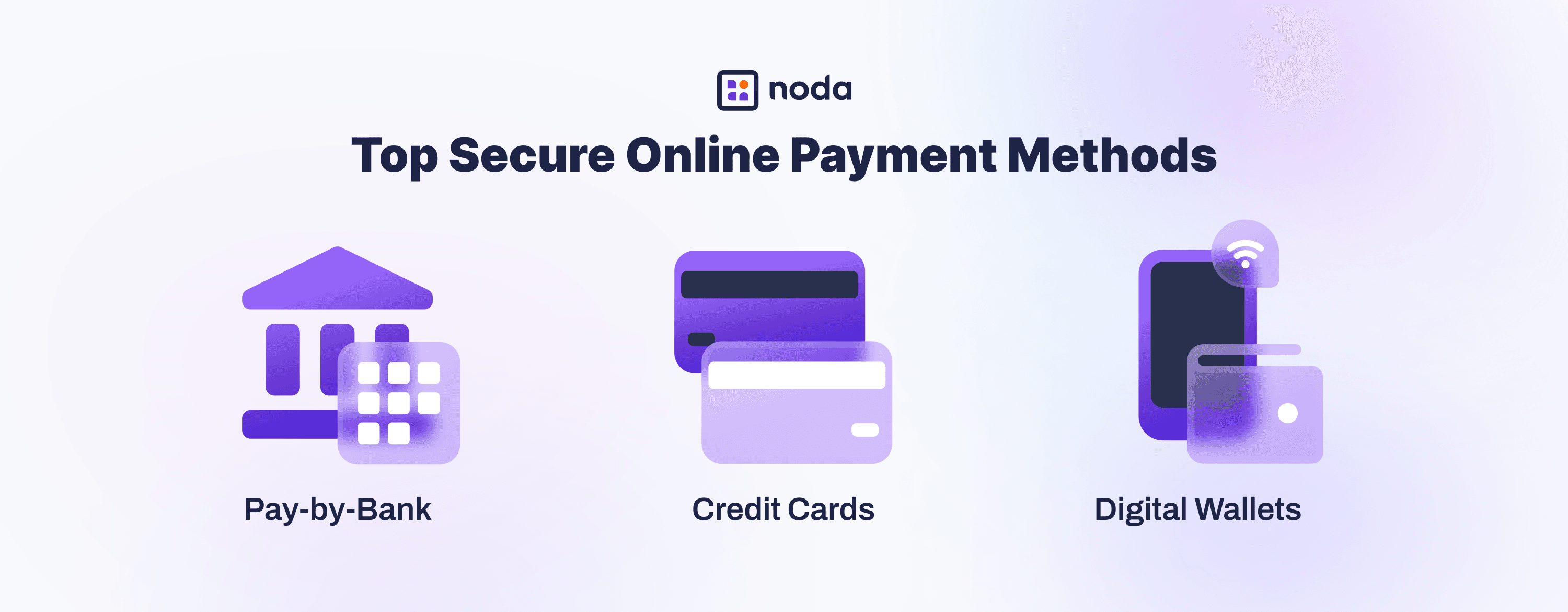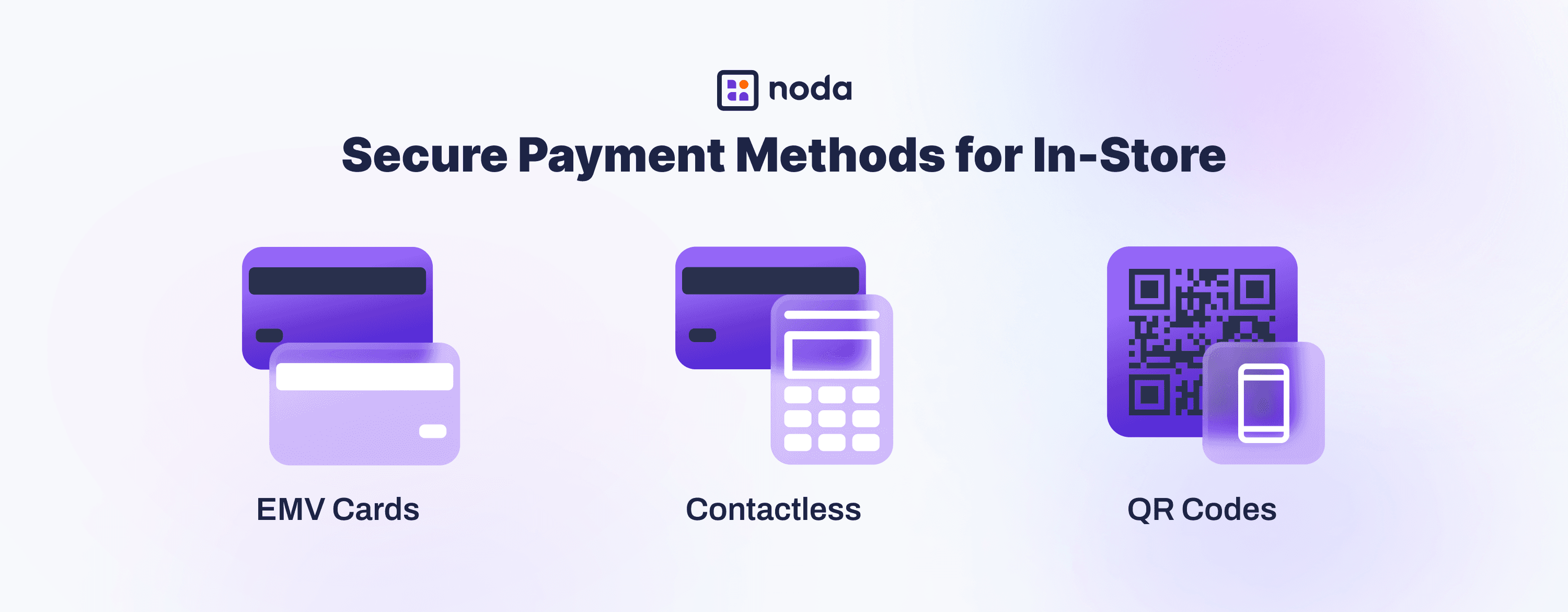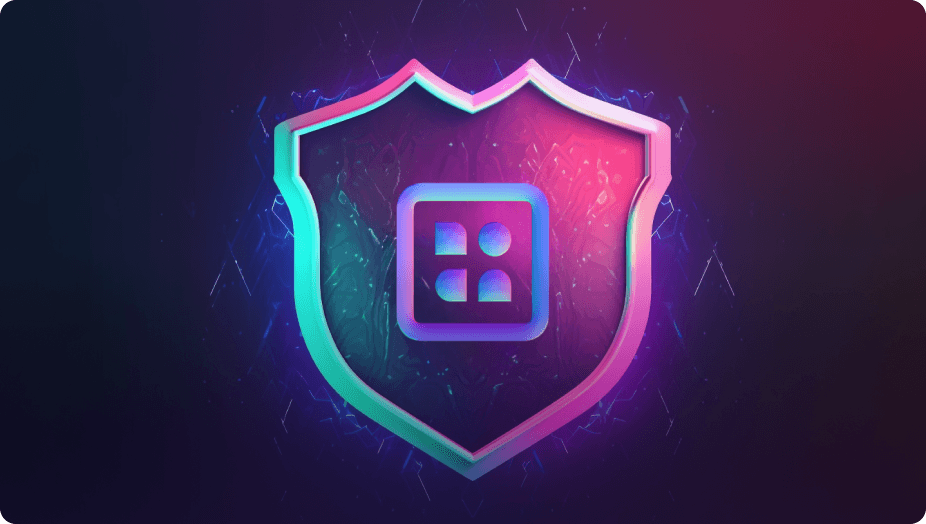
Every time a customer enters their card details or taps to pay, there’s a risk. Fraudsters are constantly evolving their tactics – phishing scams, card skimming, account takeovers, and chargeback fraud are just a few ways they target businesses and customers alike.
The numbers don’t lie. In 2022 alone, payment fraud cost businesses in the EEA €4.3 billion. In the UK, criminals stole over £1.17bn through fraudulent transactions in 2023.
While every payment method carries some risk, choosing the most secure options can protect your revenue, reduce chargebacks, and build customer trust.
Let’s break down the most secure payment methods online and in-store, and how to keep your business one step ahead of fraud.
How Secure Payment Methods Protect Transactions
Secure payment methods start with the right technology. Let’s take a look at the key tools payment providers use to ensure your transactions are safe.
Encryption
Encryption ensures that sensitive payment data is securely transmitted, making it unreadable to hackers. It works by converting plain text (like card numbers or bank details) into a coded format that only authorised parties can decrypt.
There are two main types of encryption:
- Symmetric encryption uses the same key for both encryption and decryption, making it fast but requiring secure storage.
- Asymmetric encryption uses two keys: a public key for encrypting data and a private key for decrypting it, ensuring stronger security.
Where is encryption used?
Encryption is a standard security feature in open banking payments, credit cards, EMV chip transactions, QR code payments, and digital wallets. For example, in open banking, encryption ensures that customer bank details remain protected as they authorise payments via a secure bank interface.
At Noda, we encrypt all sensitive data simultaneously on two layers. We use the Transport Layer Security (TLS) protocol when information is transferred between network servers, and we apply the Advanced Encryption Standard (AES) when the data is stored.
Utilising this two-layered encryption approach enables us to minimise potential safety concerns as sensitive data remains encrypted even on those rare occasions when one of the components is compromised.
Read more about our Noda’s security approach.
Tokenisation
Tokenisation uses a similar method to encryption, but it takes it a step further. It replaces sensitive payment information with a unique token that hackers can’t use. Unlike encryption, tokens don’t contain any real payment data – they are simply placeholders.
Where is tokenisation used?
Tokenisation is used in open banking, contactless card payments, digital wallets like Apple Pay and Google Pay, and QR code payments. This reduces the risk of fraud by ensuring that no real card details are exposed during transactions.
Multi-Factor Authentication (MFA)
MFA adds an extra layer of security by requiring users to verify their identity through multiple steps to authorise a payment. This makes it much harder for fraudsters to gain access.
MFA includes:
- Something you know (a password or PIN).
- Something you have (a phone for receiving a one-time code).
- Something you are (biometric authentication: fingerprint or facial recognition). This is one of the most secure MFA methods because it uses unique physical characteristics that cannot be easily replicated or stolen.
Where is MFA used?
MFA is a legal requirement for open banking payments under PSD2 regulation in Europe. It’s also commonly used in digital wallets, online credit card transactions, and QR code payments to ensure the person making the payment is the rightful account owner.
Fraud Detection Systems
Fraud detection systems monitor transactions in real time, using machine learning and pattern recognition to detect unusual activity. If a transaction looks suspicious, such as an unusual location or a sudden large purchase, the system may flag it for review, require additional verification, or block it entirely.
Where are fraud detection systems used?
These systems protect payments across open banking transactions, credit cards, digital wallets, EMV cards, and QR codes. For example, banks use fraud detection to track spending patterns and block unauthorised payments before they go through.
Top Secure Online Payment Methods
Let’s take a look at some of the best methods for safe online payments.

Open Banking: Pay-by-Bank
Open banking, also known as pay-by-bank, is one of the safest payment methods online. It is transforming payments across Europe. It allows customers to pay directly from their bank account, bypassing card networks entirely.
No cards mean no stolen card details, making open banking one of the most secure payment methods available. Payments are processed through regulated APIs, with banks securely sharing data with licensed providers.
Customers simply select their bank at checkout and authorise the payment within their banking app, backed by bank-level security and strong customer authentication (SCA), which is a form of MFA.
But security isn’t the only advantage. Open banking payments eliminate costly card fees, protecting merchants from interchange and scheme charges. They also remove chargebacks, speed up settlements, and offer a smoother, more seamless checkout experience.
Not convinced yet? Here are some of the stats on open banking adoption:
- In 2018, there were just 320,000 pay-by-bank payments in the UK. By 2024, that number exploded to 224 million. (GDS Link)
- The UK leads Europe, with 13% of digitally active consumers and 18% of small businesses already on board. (Open Banking UK)
- Open banking market is set to hit $164.8 billion globally by 2032. (Spherical Insights)
Read more about why we choose open banking.
Integrate Pay-by-Bank with Noda
Merchants can easily integrate open banking payments through a secure payment platform like Noda, using our Open Banking APIs or e-commerce plugins for platforms like WooCommerce, OpenCart, PrestaShop, and Magento.
Accept open banking and card payments and send payouts seamlessly, cutting fees and eliminating chargebacks. With access to 2,000+ banks across 28 countries, Noda supports multiple currencies and operates globally, making expansion effortless. Easy integration is at the core of our platform.
Optimise conversions with an AI-powered checkout that ensures real-time, frictionless payments. For businesses without in-house tech teams, our no-code payment pages, payment links and QR codes offer instant setup.
Noda’s advanced data tools provide deep customer insights, from secure bank login authentication to data enrichment, helping you make smarter business decisions.
Elevate your business with Noda’s secure open banking solution.
Digital Wallets
Digital wallets like PayPal, Google Pay, and Apple Pay are secure payment services that are changing the way people pay. Instead of entering card details for every transaction, users simply link their bank card once and check out with a tap or click – faster, safer, and more convenient.
The numbers speak for themselves. By 2025, digital wallets will account for over 52% of global e-commerce transactions.
Security is a key advantage. Digital wallets use multi-factor authentication, biometric recognition, and encryption to keep transactions safe.
Integration: For merchants, integration is simple – most payment providers offer API-based solutions, making it easy to accept digital wallets at checkout.
Credit Cards
Credit cards remain a top choice among safe and secure payment options, particularly for high-value purchases. In Europe, 27% of all e-commerce transactions are made with credit cards, rising to 36% in the UK, the region’s largest e-commerce market.
Security is a major advantage. Encryption, fraud protection, and virtual card numbers help prevent unauthorised transactions. Most credit card providers also offer zero fraud liability, meaning customers aren’t held responsible for fraudulent charges.
Important for merchants: In Europe, PSD2 regulations require banks and payment providers to refund unauthorised transactions unless fraud or negligence is suspected. Section 75 of the UK Consumer Credit Act adds extra protection – credit card issuers are jointly liable with retailers for purchases between £100 and £30,000. Debit cards, on the other hand, only offer chargeback protection to customers.
Integration: For merchants, credit card acceptance is simple. Integration is available via APIs, plugins, and secure payment gateway providers, making it easy to add credit cards to checkout flows.
Secure Payment Methods for In-Store

EMV Cards
EMV chip cards are debit and credit cards with a built-in microchip that adds extra security. Unlike magnetic stripe cards, which store static data, the chip creates a unique transaction code each time you pay. This makes it nearly impossible for fraudsters to copy or clone the card.
When a customer inserts their EMV card into a chip reader, the terminal checks the chip’s authenticity and generates a one-time code for that specific transaction. Depending on the setup, the customer may enter a PIN or sign to complete the payment.
Integration: Merchants who want to accept this payment method would need a physical card reader and PoS system.
Contactless
Contactless payments, such as tap-to-pay credit cards and mobile wallets, allow customers to make safe, touch-free in-person payments using near-field communication (NFC) technology. They are taking over in popularity compared to EMV cards, especially since the global pandemic.
This method uses tokenisation to ensure that each transaction has a unique one-time use code to prevent counterfeit fraud and ensures that no customer data is part of the transaction.
Most newly issued and renewed credit and debit cards now include contactless technology.
Integration: Merchants who want to accept this payment method would need a physical PoS reader or a PoS software to read contactless cards on their mobile.
Alternative to Contactless: QR Codes
Instead of tapping a card, customers simply scan a QR code, confirm, and pay on their mobile – no extra hardware, no PINs.
Merchants can instantly generate a unique QR code linked to a branded payment page. Customers scan the code, review the transaction, select their payment method, and authorise the payment – all in seconds.
Integrate QR Codes for In-Store Payments
With Noda’s QR code & payment link solution, accepting payments has never been easier. Whether you're selling online, in-store, or through social media, Noda’s secure payment processing offers the flexibility to take it anywhere – instantly.
Generate scannable QR codes & payment links on the fly – no complex setup needed.
Let customers pay across different channels, whether in person, through email, or on social media. Use Noda’s no-code payment pages for a seamless, branded checkout experience – no technical expertise required.
FAQs
Is online payment safe?
Yes, but it depends on the payment method. Secure options like open banking, digital wallets, and EMV chip cards use encryption, tokenisation, and multi-factor authentication (MFA) to protect transactions from fraud.
What is the safest way to pay online?
Open banking (pay-by-bank) is one of the most secure ways to pay online. It bypasses card networks, eliminating the risk of stolen card details. Transactions are processed through secure, regulated APIs with bank-level security.
How can you make online payments safer?
Use payment methods with strong encryption, tokenisation, and MFA. Open banking, digital wallets, and credit cards with fraud protection offer the highest security. Ensure there is a fraud-monitoring system in place.
Which payment option offers the best security?
Open banking payments, digital wallets (Google Pay, Apple Pay), QR code payments and EMV chip cards offer the highest security. These methods use encryption, tokenisation, and real-time fraud detection to prevent unauthorised access.
Is Noda secure?
Yes, Noda uses bank-level security, encryption, and strong customer authentication (SCA) to protect transactions. It connects to 2,000+ banks via regulated open banking APIs, ensuring a safe and seamless payment experience for merchants and customers.
Latest from Noda

Top Payment Methods in Austria: How to Accept Payments Efficiently in 2026

GoCardless Review 2026: What Merchants Need to Know

AIS vs PIS in Open Banking: What’s the Difference & When to Use Each


